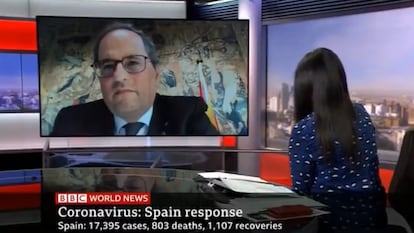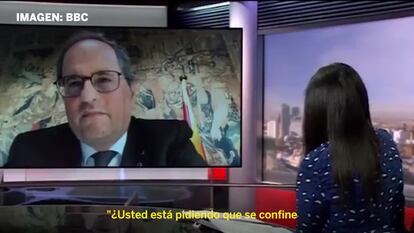Catalan premier tells BBC that Madrid is blocking coronavirus lockdown in his region
Criticized by government officials for “misrepresenting the truth,” Quim Torra later said his words had been poorly translated

The Catalan premier, Quim Torra, on Thursday suggested in a BBC interview that the Spanish government is not implementing its own lockdown orders to deal with the coronavirus crisis. The separatist leader also said that the Spanish executive has left him without the necessary powers to combat the pandemic in his region.
Following a string of critical comments from government officials about his “misrepresentation of the truth,” Torra on Friday said that his statements on the BBC had been “poorly translated” and that when he asked for the confinement of citizens, he was in fact requesting stricter measures than those already decreed by the Spanish government. As an example, he said that “only people who work in essential services” should be allowed out of their homes.
Last week the Spanish government declared a state of alarm for 15 days, evoking emergency powers in a bid to curb the rapid spread of the disease, which has already killed more than a thousand people and infected nearly 20,000, making Spain one of the worst-hit countries in the world.
Under the emergency rules, all citizens have been ordered to stay at home except for essential business, such as buying groceries or going to work if telecommuting is not possible. Violators face fines and more than 100 people have been arrested for disobeying the lockdown, according to law-enforcement agencies.

But Torra seemed to suggest that the nationwide confinement orders had not been implemented in Catalonia. “We believe that only if we confine ourselves at home, if we stay at home, if we take care of ourselves, this fight against the coronavirus can be won,” he said, noting that the central government is opting to keep open airports and ports, “and we think that this is not the best solution.”
Asked about the measures that the Catalan government is adopting against the health crisis, Torra told the BBC interviewer that their powers have been centralized and as a result, the Catalan government is less able to “help our people.”
We believe that only if we confine ourselves at home, if we stay at home, if we take care of ourselves, this fight against the coronavirus can be wonQuim Torra, Catalan premier
Torra’s remarks alluded to the fact that the Catalan government wants to enforce even stricter restrictions and prevent people from leaving their homes even for work-related reasons. The regional government also wants to cut off access to Catalonia by land, sea and air. On Friday of last week, Torra called for the entire region to be isolated, and requested help from Madrid to do so.
In the BBC interview, Torra lamented that the central government thinks “it is preferable to maintain open airports and ports.” The Catalan government does not have the powers to close the border with France or major infrastructure such as airports and train stations.
A spokesman for El Prat airport in Barcelona said that there were 278 departures and arrivals on Thursday, around 30% of the usual volume. Most of the flights were bringing Spaniards home or taking foreigners back to their countries as part of ongoing repatriation efforts.
Reaction
On Friday, a European Commission spokesperson said that it is up to member states to decide what measures must be taken against the coronavirus in their own regions, in observance of their Constitution.
Also on Friday, Spain’s Interior Minister Fernando Grande-Marlaska asked Torra for “a bare minimum amount of institutional loyalty and cooperation” to guarantee public health during this crisis. And Defense Minister Margarita Robles said in an interview on the state radio RNE that “not everything goes,” and that Torra was disqualifying himself by “misrepresenting the truth.”
English version by Susana Urra.
Tu suscripción se está usando en otro dispositivo
¿Quieres añadir otro usuario a tu suscripción?
Si continúas leyendo en este dispositivo, no se podrá leer en el otro.
FlechaTu suscripción se está usando en otro dispositivo y solo puedes acceder a EL PAÍS desde un dispositivo a la vez.
Si quieres compartir tu cuenta, cambia tu suscripción a la modalidad Premium, así podrás añadir otro usuario. Cada uno accederá con su propia cuenta de email, lo que os permitirá personalizar vuestra experiencia en EL PAÍS.
¿Tienes una suscripción de empresa? Accede aquí para contratar más cuentas.
En el caso de no saber quién está usando tu cuenta, te recomendamos cambiar tu contraseña aquí.
Si decides continuar compartiendo tu cuenta, este mensaje se mostrará en tu dispositivo y en el de la otra persona que está usando tu cuenta de forma indefinida, afectando a tu experiencia de lectura. Puedes consultar aquí los términos y condiciones de la suscripción digital.








































